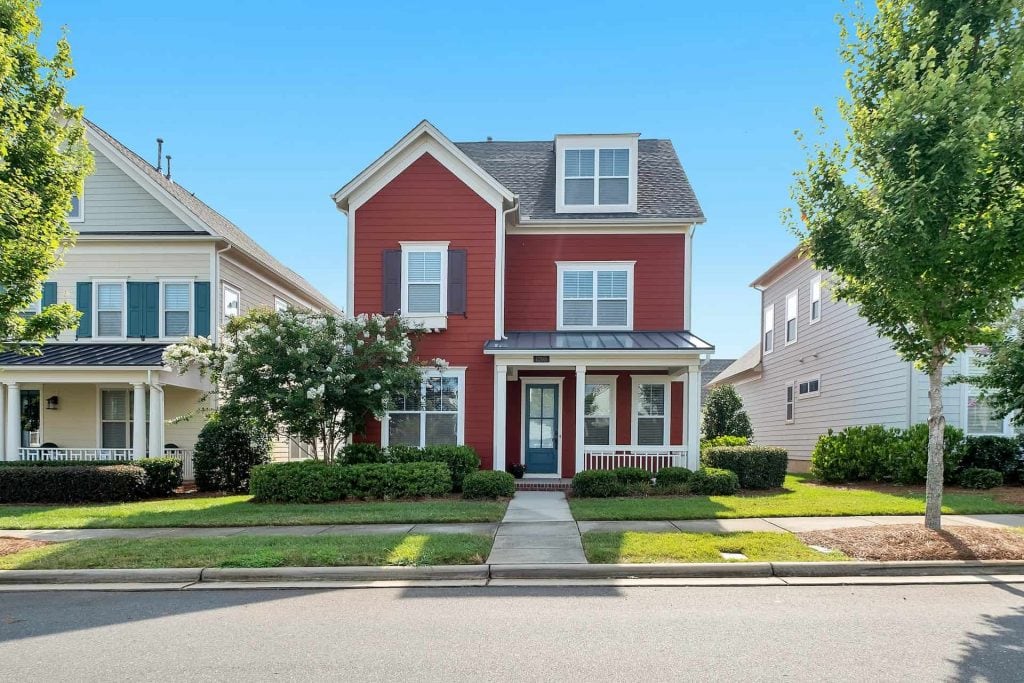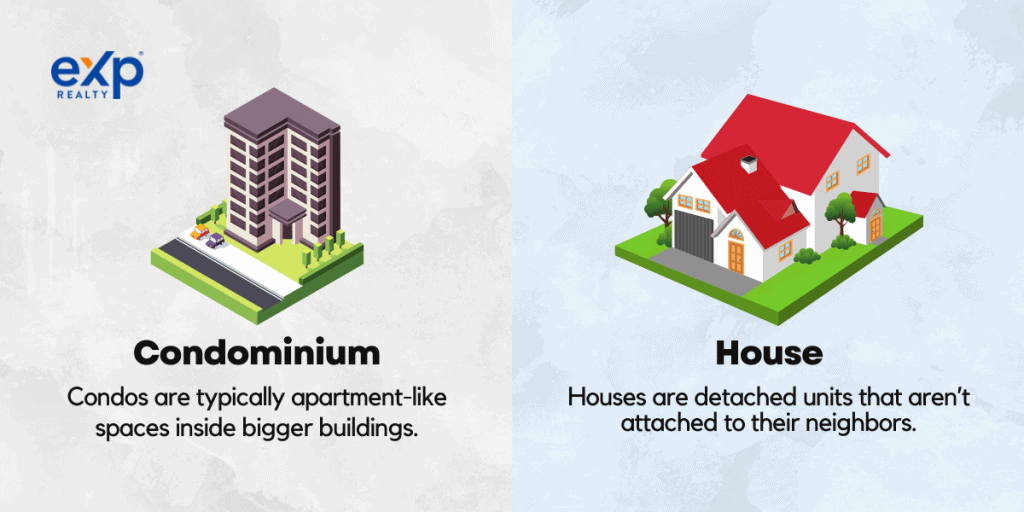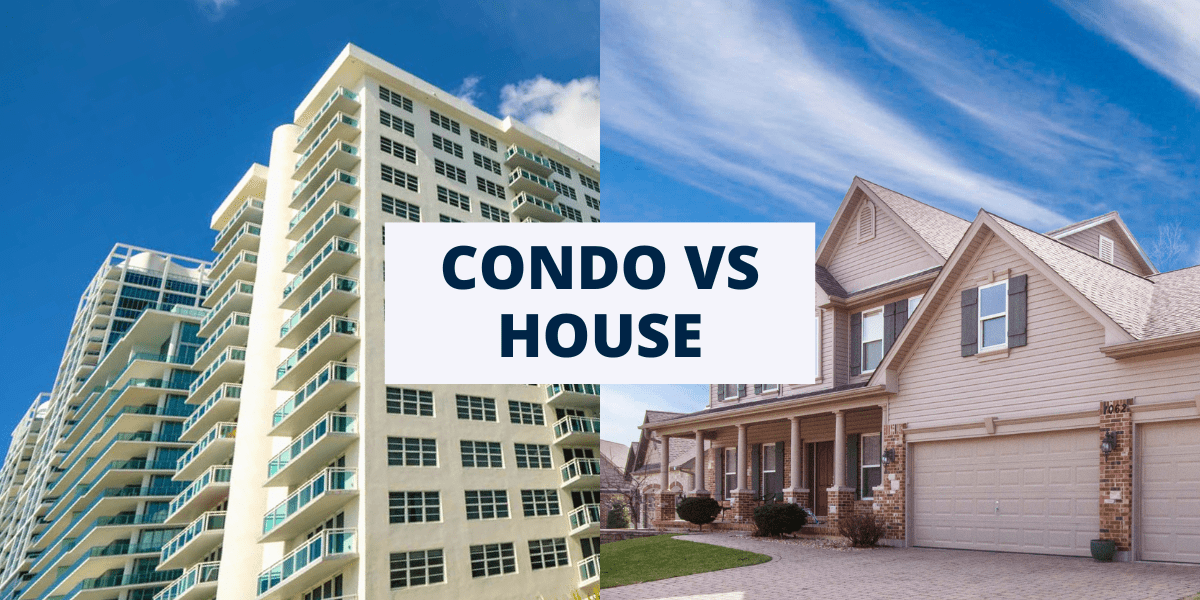As housing prices and the cost of living have soared, many people have wondered about alternative housing options. While most people think of detached, single-family homes when it comes to ownership, other options are also available.
As condominiums (condos for short) tend to be less expensive than other types of properties, many potential property owners have wondered: what does condo living entail, and is it right for me? Keep reading for a comparison of condo vs. house.
What Is a House?

In real estate, when someone refers to a house, they typically mean a free-standing house owned by one person responsible for the entire building. Houses may be on large or small plots, but most have yards, driveways, and garages.
Typically, when considering the differences between houses and condos, many people point to homeowners associations (HOAs), which all condos have, and many houses do not. But increasingly, new housing developments have HOAs as well.
In neighborhoods with detached homes and HOAs, HOAs closely regulate acceptable appearances for the outsides of homes, lawn requirements, community resources, and more.
HOAs for houses are usually a way to increase and protect property values. HOAs create attractive neighborhoods because they tend to have higher property values than homes with poor yards or obvious exterior problems.
HOAs also protect property values by creating community centers that can only be used by property owners that pay their dues. These community centers might include:
- Community swimming pools
- Tennis courts
- Neighborhood parks
- Picnic areas
Living in a house comes with several advantages:
- You own the home and the land.
- You have more privacy as there might not be shared walls.
- You can make any changes you want without discussing them with your neighbors.
What Is a Condo?

A condo is an individual unit in a condo complex or development. Condo developments can be significant and have hundreds of units or may be smaller, with as few as four or five units.
A separate property owner owns each condo unit. Condo owners do not own the land their property is on, nor the building their home is in. Owners mostly have control of their individual units, while the HOA makes decisions that affect all units.
HOAs charge monthly or annual fees to cover costs that affect everyone in the building. These fees can range from a few hundred dollars per year in small communities to thousands of dollars per month in luxury condo communities.
HOAs often make decisions and manage the following aspects of property maintenance:
- Whether or not condo owners can have pets
- The monthly or yearly HOA fee
- Whether or not rentals are allowed in the building
- Parking garages or parking lots for the building
- Exterior spaces and maintenance
- Management of community spaces
Living in a condo has several benefits compared to living in a house. A condo is usually smaller, so the costs will be lower, and it’s easier and quicker to clean. The HOA will take care of the maintenance of the common areas, and you might have access to shared amenities like a pool, a tennis court, or a gym.
What’s the Difference Between a Condo and a House?

Condos are typically apartment-like spaces inside bigger buildings. On the other hand, houses are detached units that aren’t attached to their neighbors.
In both cases, property owners may pay a monthly mortgage payment until they have paid the property off if they borrowed money to buy it. One of the most significant differences between condos and detached houses is that condos require owners to pay monthly fees to maintain the building and shared spaces.
Some individually-owned houses also have monthly or yearly fees for managing community pools, outdoor spaces in the neighborhood, or other rules and regulations. However, these fees are typically much lower than condo association fees and cover fewer aspects of home maintenance.
A house owner owns the house and the land where it was built while the owner of a condo only owns the apartment itself.
Factors To Consider When Choosing Between a Condo and a House
There are many factors to consider when choosing between condo vs. house. Cost is one of the most significant factors, but there are other important considerations you should understand as well.
While we’ve outlined the most significant considerations, many factors may be specific to individual buyers. If you need help deciding which option is better, consider talking to a real estate agent or property expert about those options.
Costs
Despite having monthly HOA fees, condos tend to be less expensive than houses. This cost differential is primarily because the property value of condos tends to be lower, but other costs are cheaper in condos as well.
Here we have outlined the primary costs that property owners face and which type of property is likely to be less expensive. While these determinations largely hold true, it’s important to remember that these costs can vary greatly depending on your area.
Utilities
While both condos and houses have utilities to pay, your utility costs will likely be lower in a condo because you will have a smaller space to heat, cool, or light.
Condo HOAs will likely cover utility costs for the outside of your building, such as hallway or courtyard lights, snow plowing in colder regions, or trash and sewer costs, further decreasing condo utility costs.
Property taxes
Houses and condos have to pay the same local and state property taxes. In many cases, the total cost of property taxes will be lower in a condo than in a house because the property value is lower, and the property value determines property taxes.
Mortgages and Mortgage Insurance
Unless you can purchase your home in cash, property owners for any property type will have to pay a mortgage and – in some cases – mortgage insurance.
While condos tend to have lower listing prices, they also tend to have higher mortgage rates than houses due to the additional risk of the building filing for bankruptcy. Houses cost more overall but have lower mortgage rates because lenders can better manage risks.
Insurance
Condo insurance tends to be less expensive than home insurance because it only has to cover the inside of your home. Damage to the outside of a condo building is covered by the building’s insurance, which you pay through your HOA fee.
Insurance costs for single-family homes have to cover your entire property and are usually more expensive.
Privacy and Freedom

Detached homes have far more privacy than condos. Condo owners share walls, hallways, elevators, and stairs with their neighbors. Living wall-to-wall with people almost always comes with noise that some property owners would rather avoid.
In addition to privacy, homes have more freedom. While condominium owners can do most things with the inside of their homes, they need more control over building policies and upkeep. In some cases, condos may regulate how you can use your balcony or whether pets are allowed in the building, further restricting the freedom of condo owners.
Additionally, while condos must have associations to cover the costs of exterior building maintenance, you will likely have a choice of whether or not you want to be in an HOA when you purchase a house.
Maintenance
The inside of your home is your responsibility, no matter which property you buy. You must maintain your appliances, floors, walls, and interior plumbing wherever you live.
In condos, you will have a monthly maintenance fee that covers exterior building maintenance and upkeep of common areas. For example, if you have a community laundry center, your monthly maintenance fee will ensure access to a working washer and dryer.
You won’t have monthly maintenance fees in houses and can fix and maintain your property in whatever way works for you. On the other hand, significant issues will also be your responsibility. Finding contractors and scheduling home repairs will be your responsibility if you have roof damage from a storm or your home floods.
For many people, the monthly cost of a condo HOA fee is well worth the services they receive. In many large condos, a professional property manager will ensure the building operates as it should.
Location
There tend to be more condos than houses available in densely populated cities, and they tend to be closer to the city center. If you want to live close to downtown in a major city and you don’t have a larger budget, a condo might be your only option.
On the other hand, if you want to live in a smaller town or rural area, you may have limited access to condos. Often, the only condos available in small towns are senior living centers or retirement communities with age restrictions.
Space
Houses tend to have more yard and living space than condos. Condos may have under 1,000 square feet of living area, while homes in the United States have, on average, about 2,500 square feet of space.
Outdoor space is also an important factor to consider. Most condos have very little outdoor space, if any. When condo owners do have access to outdoor space, it often cannot be used for certain activities like gardening or personal projects.
Community
The kind of community and connection you have depends on the kind of condo or neighborhood you live in. Many suburban neighbors have stronger community connections than some condos, despite being spread farther apart.
The differences in community bonds are primarily due to the transient nature of many condos. Many condo owners use them mainly as investment properties they rent out, and renters tend to move more than owners. Even those who purchase and live in their condos often purchase their condos to build equity to build a single-family home down the road.
That said, condos that don’t allow rentals have a built-in community. You can make friends and connect with your neighbors by utilizing community resources like gyms, pools, or shared laundry spaces.
Transitioning To a Rental Property
If you’re considering using your property for general rental income down the road, a condo might be a better option for you. Condos are generally easier to rent out than houses, and you will have fewer landlord responsibilities because of professional building managers.
If you want to use your property for rental income, check with the rules of your potential condo, as some complexes do not allow rentals in their buildings. While this might be a benefit while you’re living there – owners tend to have more respect for their building and neighbors – it also means that you will have to sell when you move out.
Who Should Buy a House?
Choose a house over a condo if you want to own and manage your land. For example, if you like to garden or want a private outdoor space for your children or pets, a detached house with a yard is likely a better option.
In a condo, you will not be able to control choices about outdoor maintenance or the aesthetics of your building outside of the areas you own. If you want to control these decisions, consider choosing a house over a condo.
A detached house is better for you if you prefer additional space between you and your neighbors or extra privacy. Condo units are typically very close together, and you likely will hear your neighbors to the side or above you. Traditional houses afford you extra room and privacy that you would not have in a condo.
If you want to avoid being responsible for repairs and building upkeep, you should not choose to buy a house. Homeowners are responsible for maintaining their entire property, including roof repairs, window cleanings, and more.
Who Should Buy a Condo?
Condos can be great investment property or personal property for many people. Because they have slightly more responsibility than rentals but less than detached, traditional homes, condos are a popular choice for first-time home buyers.
Detached houses in major city centers are often non-existent or too expensive for most people, but rent can feel like throwing money down the drain. For these people, condo ownership can be a great way to build equity without leaving the city center and urban living behind.
Condos require much less work than houses, which makes them a popular choice for those heading into retirement or downsizing later in life. If you don’t want to have to perform or manage exterior maintenance yourself, a condo might be the right choice for you.
One of the major benefits of condo ownership is access to amenities that most single-family homeowners don’t have. Many condo buildings – especially luxury ones – have full gyms, pools, roof access, and more.
If you plan to rent your property, consider choosing a condo over a house. Condos generally require less work from landlords and are easier to find tenants for.
Bottom Line
Overall, if you want to own your entire property, have additional privacy, or want complete control over your home, a single-family house might be the right choice for you. If you want to live in an urban center, don’t want to manage maintenance on the outside of your building, or want access to community resources, a condo might be a better option.
Remember that there’s no one-size-fits-all in property ownership when comparing condo vs. house. If you’re on the fence about which option will work better for you, consider meeting with a real estate professional for personalized advice.
FAQs About Condo Vs. House
Why is a condo better than a house?
For some homeowners, condos are better than houses because they are less work and have fewer maintenance costs. Additionally, many condos have benefits like fitness centers, community pools, or other common spaces.
What are the disadvantages of buying a condo?
The most significant disadvantages to buying a condo are that you must pay HOA fees, lack privacy, have less overall square footage, and will not own the land your property is on.
Are condos safer than houses?
Regarding crime, condos, and apartments are safer than houses because they have multiple points a burglar would have to get through.
Is a house cheaper than a condo?
No, generally, houses are more expensive than condos, though individual costs often vary by region.
Is a condo a risky investment?
Condos are riskier investments than houses because a homeowners association operates them, not just the homeowner. It is possible, though unlikely, for condo communities to go bankrupt.
Do you permanently own a condo?
Yes, a condo is yours to own until you decide to sell. However, you will not own common spaces or your condo’s land.
Is owning a condo worth it?
Whether or not owning a condo is worth it is largely up to individual buyers. What is a great investment for one person might not be worth it for another.
Do you pay property tax on a condo?
Yes, condo owners pay all applicable property taxes just like homeowners do.
Is retiring in a condo a good idea?
You will usually have to do less of your maintenance in a condo, which can make it an excellent choice for retirement.
How many years do you have to pay for a condo?
You will have to pay a mortgage on a condo for the length of time you agreed to with your lender. You must pay the HOA fees on a condo for as long as you own it.
Do homes appreciate faster than condos?
Single-family homes generally appreciate faster than condos and townhouses, though this may differ in fast-growing real estate markets.





